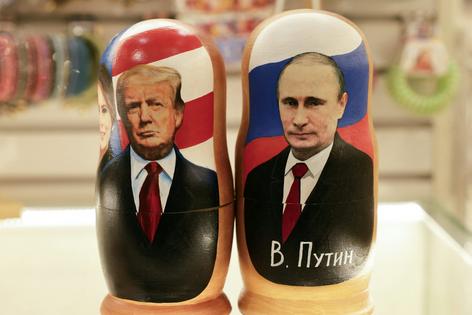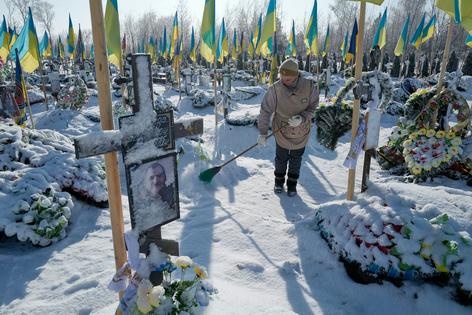Trump’s move to closer ties with Russia does not mean betrayal of Ukraine, yet – in his first term, Trump was pretty tough on Putin
Published in Political News
The United States’ steadfast allegiance to Ukraine during that country’s three-year war against Russia appears to be quickly disintegrating under the Trump administration. President Donald Trump on Feb. 19, 2025, called Ukrainian President Volodymyr Zelenskyy “a dictator” and falsely blamed him for the war that Russia initiated as part of a land grab in the countries’ border regions.
Zelenskyy, meanwhile, said on Feb. 19 that Trump is trapped in Russian President Vladimir Putin’s “disinformation space.”
The intensifying bitterness comes as the U.S. and Russia started talks in Saudi Arabia, without including Ukraine, on how to end the conflict.
The U.S. and Russia have long been adversaries, and the U.S., to date, has given Ukraine more than US$183 billion to help fight against Russia. But that funding came when Joe Biden was president. Trump does not appear to be similarly inclined toward Ukraine.
Amy Lieberman, a politics editor at The Conversation U.S., spoke with Tatsiana Kulakevich, a scholar of Eastern European politics and international relations, to understand the implications of this sudden shift in U.S.-Russia policy under Trump.
Kulakevich sees Trump’s moves that could be perceived as self-interested as instead part of a calculated strategy in preliminary discussions.
Can you explain the current dynamic between the U.S., Ukraine and Russia?
People should not panic because the U.S. and Russia are only holding exploratory talks. We should not call them peace talks, per se, at least not yet. It was to be expected that Ukraine was not invited to the talks in Saudi Arabia because there is nothing to talk about yet. We don’t know what the U.S. and Russia are actually discussing besides agreeing to restore the normal functioning of each other’s diplomatic missions.
People are perceiving the U.S. and Russia as being in love. However, Trump’s Russia policy has been more hawkish than often portrayed in the media. Looking at the record from the previous Trump administration, we can see that if something is not in the interests of the U.S., that is not going to be done. Trump does not do favors.
He approved anti-tank missile sales to Ukraine in 2019. That same year, Trump withdrew from the Intermediate-Range Nuclear Forces Treaty, an agreement with Russia that limited what weapons each country could purchase, over Russian violations.
In 2019, Trump also issued economic sanctions against a Russian ship involved in building the Nord Stream 2 gas pipeline. These sanctions tried to block Russia’s direct gas exports to Germany – this connection between Russia and Germany was seen by Ukraine as an economic threat.
Based on Trump’s talks with Russia and remarks against Ukraine, it could seem like the U.S. and Russia are no longer adversaries. How do you perceive this?
There are no clear indications that Russia and the U.S. have ceased to be adversaries. Despite Trump’s occasional use of terms like “friends” in diplomacy, his rhetoric often serves as a tactical maneuver rather than a genuine shift in alliances. A key example is his engagement with North Korea’s Kim Jong-un, where Trump alternated between flattery and threats to extract concessions.
Even if the U.S. is meeting with Russia and the public narrative seems to say otherwise, strategically, abandoning Ukraine is not in the United States’ best interests. One reason why is because the U.S. turning away from Ukraine would make Russia happy and China happy. Trump has treated China as a primary threat to the U.S., and China has supported Putin’s invasion of Ukraine.
U.S. Secretary of State Marco Rubio is also still saying that everyone, including Ukraine, will be at the table for eventual peace talks.
The allegations that Russia was holding some information over Trump and blackmailing him started long before this presidential term and did not stop Trump from imposing countermeasures on Russia during his first term. The first Trump administration took more than 50 policy actions to counter Moscow, primarily in the form of public statements and sanctions.
What does the U.S. gain from developing a diplomatic relationship with Russia?
Trump is a transactional politician. American companies could profit from the U.S. aligning with Russia and Russian companies, as some Russian officials have said during the recent Saudi Arabia talks with the Trump administration. But the U.S. could also benefit economically from the Trump’s administration’s proposed deal with Ukraine to give the U.S. half of Ukraine’s estimated $11.5 trillion in rare earth minerals.
Zelenskyy rejected that proposal this week, saying it does not come with the promise that the U.S. will continue to give security guarantees to Ukraine.
Historically, since the Cold War, there has been a diplomatic triangle between the Soviet Union – later Russia – China and the U.S. And there has always been one side fighting against the two other sides. Trump trying to develop a better diplomatic relationship with Russia might mean he is trying to distance Russia from China.
A similar dynamic is playing out between the U.S. and Belarus’ authoritarian leader, Alexander Lukashenko, a co-aggressor in the war in Ukraine. Lukashenko is close with both Russia and China. The U.S. administration is looking to relax sanctions on Belarusian banks and exports of potash, a key ingredient in fertilizer, in exchange for the release of Belarusian political opposition members who are imprisoned. There are over 1,200 political prisoners in Belarus. This U.S. foreign policy strategy is aimed at providing Lukashenko with room to grow less economically dependent on Russia and China.
Is this level of collaboration between the U.S. and Russia unprecedented?
While U.S.-Russia relations are often defined by rivalry, history shows that pragmatic cooperation has occurred when both nations saw mutual benefits – whether this relates to arms control, space, counterterrorism, Arctic affairs or health.
Moreover, the U.S. has always prioritized its own interests in its relationship with Russia. For example, the U.S. and its allies imposed sanctions on Russia’s uranium and nickel industries only in May 2024, over two years after Russia’s full-scale invasion of Ukraine in February 2022. This was due to the United States’ strategic economic dependencies and concerns about market stability if it sanctioned uranium and nickel.
Even after Russia invaded Crimea – an area of Ukraine that Russia claims as its own – in 2014 and provided support for Russian separatists in Ukraine’s Donbass region, the U.S. and other Western countries imposed largely symbolic sanctions. This included freezing assets of Russian individuals, restricting some financial transactions and limiting Russia’s access to Western technology.
We should also notice that Trump in January 2025 promised to sanction Russia if it does not end the Ukraine war. The U.S. still has not removed any existing sanctions, which signals its commitment to a tough stance on Russia, despite perceptions of a close relationship between Trump and Putin.
Given Trump’s transactional approach to foreign policy, his tough rhetoric on Zelenskyy could be a deliberate negotiation strategy aimed at pressuring Ukraine into making greater concessions in potential peace talks, rather than signaling abandonment.
This article is republished from The Conversation, a nonprofit, independent news organization bringing you facts and trustworthy analysis to help you make sense of our complex world. It was written by: Tatsiana Kulakevich, University of South Florida
Read more:
On Ukraine, candidate Trump touts his role as dealmaker while Harris sticks with unwavering support
Putin’s visit to Mongolia defies ICC warrant and tests neutral nation’s ‘third neighbor’ diplomacy
US will give military tanks to Ukraine, signaling Western powers’ long-term commitment to thwarting Russia
Tatsiana Kulakevich does not work for, consult, own shares in or receive funding from any company or organization that would benefit from this article, and has disclosed no relevant affiliations beyond their academic appointment.


































































Comments